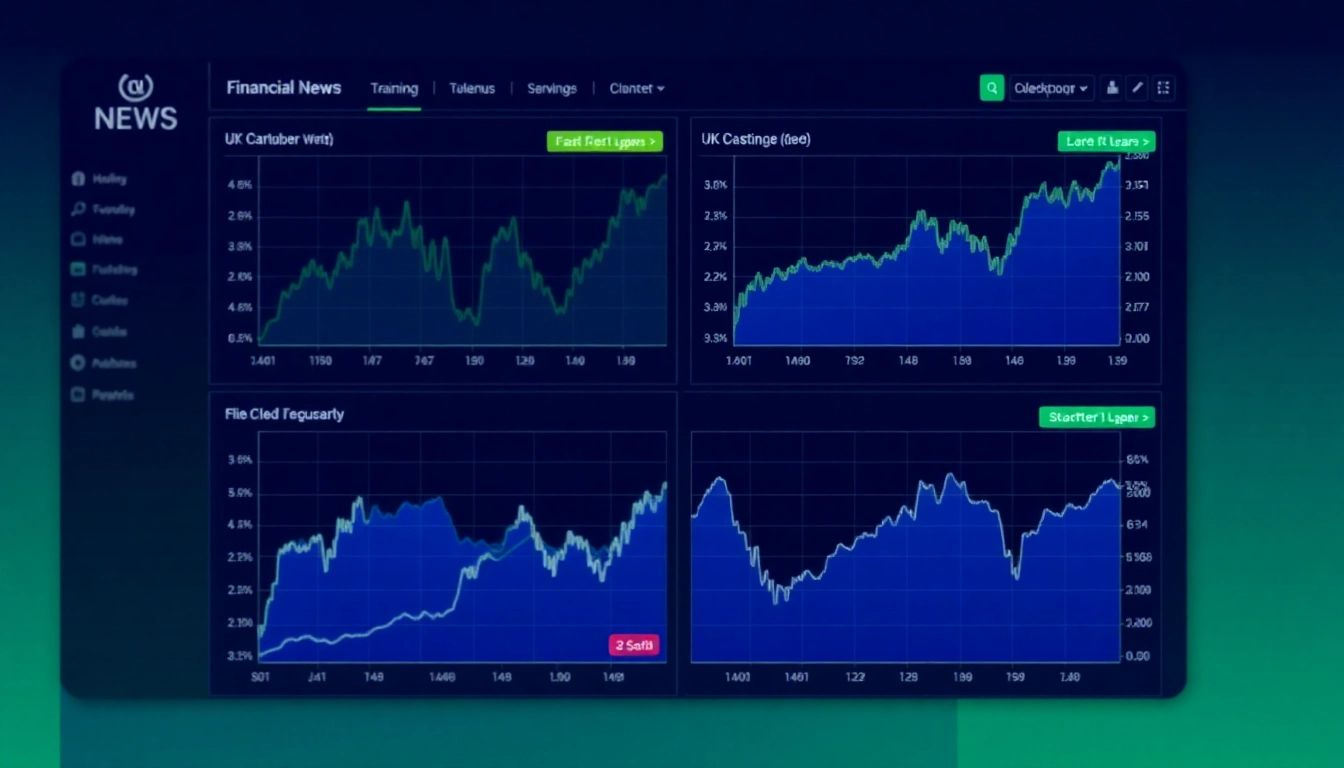
Current UK Stock Market Performance: A Detailed Analysis
The UK stock market, a vital component of the nation’s economic landscape, has recently experienced a period of cautious optimism mixed with strategic reassessment. As global markets demonstrate resilience amid geopolitical fluctuations and economic uncertainties, the UK indices have shown a nuanced performance pattern. Investors and analysts alike are keenly observing the trends, driven by various domestic and international factors that influence market directions. To understand the current state, it is essential to examine recent movements, key indices, and the overarching global economic environment shaping UK stock performance.
Recent Market Gains and Declines
In the last quarter, the UK stock market has seen notable gains, buoyed by positive economic data and improved corporate earnings reports. The FTSE 100, a benchmark reflecting large-cap UK companies, notably increased by approximately 2.1% over the month, driven primarily by strong performances in sectors such as financials, healthcare, and energy. Conversely, certain underperforming sectors, like retail and travel, experienced declines amid ongoing supply chain challenges and fluctuating consumer confidence. Such mixed results underscore the importance of sector-specific analysis for investors seeking to navigate the current landscape effectively.
Major Indices and Their Movements
The main UK indices tell a detailed story of resilience and cautious optimism. The FTSE 100, with its heavy weighting in multinational corporations, benefits from the relative strength of global markets and the depreciation of the British Pound, which makes exports more competitive. Meanwhile, the FTSE 250, representing mid-cap companies more domestically focused, exhibits variations influenced by UK-specific economic policies and domestic consumption trends. Analysts note that while the FTSE 100 remains steady, the FTSE 250 shows signs of increased volatility, signaling shifting investor sentiment toward domestic economic recovery.
Impact of Global Economic Factors
Externally, global economic dynamics have exerted considerable influence on UK stocks. The rise of Asian markets, especially headlines about China’s strong indices and economic data, has provided a positive backdrop for international investor confidence. Simultaneously, the US Federal Reserve’s hints at potential rate cuts have galvanized commodities and gold prices, indirectly benefitting UK multinationals’ international earnings. Currency trends, especially the US dollar’s near five-week lows, further impact export-oriented sectors, making UK products more competitive abroad and supporting specific stock segments.
Factors Shaping Market Movements in the UK
Economic Indicators and Data Releases
Recent economic indicators such as GDP growth figures, manufacturing PMI, and employment data have painted a cautiously optimistic picture. The UK’s GDP growth has shown signs of stabilization post-pandemic, with manufacturing and services sectors displaying resilience. However, inflationary pressures and supply chain disruptions continue to pose risks, prompting investors to scrutinize upcoming data releases closely. These metrics play a pivotal role in guiding investor expectations for future market trajectories, highlighting the importance of staying aligned with up-to-date economic reports.
Policy Decisions and Political Events
Budget announcements, fiscal policies, and political stability significantly influence UK market sentiment. Recent decisions by the Bank of England regarding interest rates—particularly hints at rate hikes or cuts—impact borrowing costs and corporate profitability. Political developments, including Brexit-related negotiations and legislative reforms, also contribute to market fluctuations. For example, easing of certain trade restrictions or favorable policies targeting innovation sectors tend to bolster investor confidence. Conversely, political uncertainty can trigger short-term volatility, emphasizing the need for strategic planning.
International Markets and Currency Trends
International markets are at the core of the UK’s economic ecosystem. Movements in Asia, the US, and Europe directly affect investor sentiment and sector performances. Notably, rising Asian stocks, coupled with a weakening US dollar, enhance export opportunities for UK companies and influence the overall market outlook. Currency fluctuations matter greatly: a weaker pound can benefit exporters but might increase import costs, affecting inflation and consumer spending patterns. Investors often employ currency hedging to manage such risks effectively.
Highlighting Key Sectors in UK Stock News
Leading Performing Sectors
The healthcare, energy, and financial sectors have outperformed recently. Healthcare companies benefit from aging populations and increased government spending on medical innovations, while energy firms rebound due to rising oil prices and renewed focus on renewable sources. Financial institutions are buoyed by higher interest rate expectations and increased borrowing activities, contributing to positive stock performances. These sectors exemplify resilience amid global economic adjustments and present promising opportunities for investors targeting growth and stability.
Underperforming Industries and Risks
On the downside, retail and travel-related industries have faced headwinds stemming from geopolitical tensions, supply chain issues, and shifts in consumer behavior. Brexit-related uncertainties continue to impact certain industries, notably manufacturing and logistics. Additionally, the ongoing inflationary environment poses a risk of cost increases, squeezing profit margins. Understanding these risks allows investors to adjust their portfolios accordingly, possibly reducing exposure to vulnerable sectors or employing hedging strategies.
Emerging Opportunities
Emergence of green energy, technological innovation, and biotech firms offer lucrative prospects. The increasing focus on sustainability, driven by government incentives and consumer preferences, creates pathways for investments in renewable energy projects and clean technology companies. Furthermore, digital transformation across industries opens opportunities in cloud computing, cybersecurity, and fintech sectors. Staying informed about policy support and technological breakthroughs is essential for capitalizing on these nascent yet promising markets.
Investing Strategies for the UK Market
Long-term vs Short-term Approaches
Choosing between long-term investment horizons and short-term trading requires careful consideration. A long-term approach benefits from compounding and resilience, particularly during economic uncertainties, by holding diversified assets aligned with growth sectors. Active traders, however, may capitalize on short-term volatility through technical analysis and rapid asset reallocation, especially in sectors demonstrating quick shifts. A balanced strategy combining both approaches can mitigate risks while seizing opportunities.
Analyzing Market Trends and Data
Data-driven decisions are paramount. Investors should leverage technical indicators, fundamental analysis, and macroeconomic forecasts to identify entry and exit points. Tools like moving averages, RSI, and fundamental ratios help assess momentum and valuation. Keeping abreast of economic indicators—such as inflation rates, job reports, and corporate earnings—provides a comprehensive picture for informed decision-making.
Risk Management and Diversification Tips
Effective risk management involves diversification across sectors and asset classes, utilization of stop-loss orders, and regular portfolio reviews. Incorporating international stocks, bonds, and alternative investments can hedge against sector-specific downturns. Additionally, understanding market cycles and employing dollar-cost averaging can smooth out volatile periods, helping investors Weather market storms with greater confidence.
Forecasting the Future of UK Stocks
Expert Sentiments and Market Predictions
Analysts are cautiously optimistic about the UK’s economic recovery trajectory, citing potential growth driven by technological innovation and green initiatives. Experts forecast that if inflation stabilizes and geopolitical tensions ease, UK stocks could see steady appreciation. Conversely, persistent uncertainties around global trade policies and inflation could introduce volatility, making prudent asset allocation even more critical.
Potential Catalysts
Upcoming catalysts include policy reforms focused on innovation, government incentives for green energy projects, and stabilization of inflation rates. Additionally, international developments such as the easing of trade tensions and currency stabilization could trigger positive market adjustments. Monitoring these catalysts helps investors align their strategies proactively.
Preparing for Market Shifts
To navigate upcoming changes, investors should maintain flexible portfolios, stay updated through reliable news sources, and consider consulting financial advisors. Building resilience through diversified holdings and maintaining liquidity provides a buffer against sudden market shocks. Preparedness remains key to thriving in an evolving economic environment.




